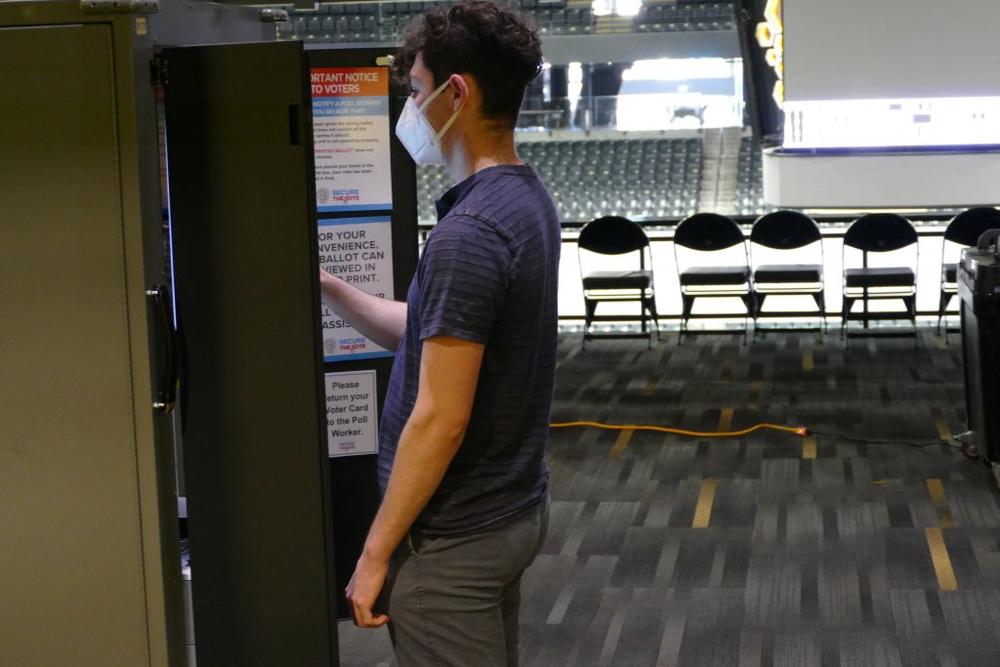
Caption
A student casts his ballot at Georgia Tech’s McCamish Pavilion in the 2021 Senate runoff.
Credit: John McCosh/Georgia Recorder

A student casts his ballot at Georgia Tech’s McCamish Pavilion in the 2021 Senate runoff.
On Tuesday, the Georgia State Election Board rejected a proposal that would have increased the number of voters casting hand-marked paper ballots in the 2024 election cycle when existing touchscreen machines raise ballot privacy concerns.
By rejecting requests to enhance ballot secrecy and security, the election board likely eliminates any possibility of meaningful election rule changes ahead of Georgia’s busy election cycle in 2024, which will gain steam with a presidential primary on March 12.
A set of proposed rules was presented Tuesday by the nonprofit Coalition of Good Governance, which is the lead plaintiff in a long-running federal lawsuit challenging the integrity of the state’s electronic voting system.
Marilyn Marks, executive director of the coalition, said that reducing the number of electronic voting machines and replacing them with paper ballots better ensures the election aligns with laws that are designed to safeguard the confidentiality of voters’ ballot choices.
Marks said the coalition aims to address privacy concerns caused by use of Dominion Voting System machines, which have been used for statewide elections since 2019. Voters cast ballots at polling places using a touchscreen mounted in a kiosk that is elevated to eye-level.
The coalition recommended giving local election officials the authority to increase paper ballot use, saying Secretary of State Brad Raffensperger has declined to implement a number of federal cyber security measures ahead of next year’s election.
“These rules we are proposing are only necessary as a stop-gap measure because the (ballot marking device) system chosen is out of compliance with the mandates of the General Assembly,” Marks said.
“The secretary of state has made no meaningful attempts to address these required mitigations prior to the 2024 election,” she said. “The counties need to be given both the encouragement and guidelines in order to act to address the needed mitigations in a uniform manner.”
A ballot secrecy plan called for placing touchscreen devices eight feet apart and in a layout so that no one could walk within 30 feet behind a voter filling out their ballot. In Marks’ view, a typical library-sized polling place would only have enough room for more than a handful of voting machines, and however the decrease of touchscreen devices could be replaced with hand-marked paper ballots that could still be scanned by Dominion machines.
The four members of the election board on Tuesday praised Marks for developing strong proposals that warrant further discussion.
Election board member, Ed Lindsey, stated that it would be premature to make a major decision concerning cyber security when the state Senate is planning hearings at which the secretary of state’s office will have to explain their mitigation efforts.
“I want to assure you if we vote something down today, that doesn’t mean we don’t consider it a serious issue or that we won’t continue looking into them in the future,” Lindsey said.

State Election Board member Janice Johnston, (far left), listens on Tuesday as Marilyn Marks, executive director of Coalition for Good Governance, states her case as to why Georgia voters should have greater access to hand marked paper ballots in 2024.
Election Board member Janice Johnston explained how absentee ballots can be more vulnerable to being photographed, which is a violation of privacy laws. Johnston was the only board member who voted to enforce stronger rules that open up public access while equipment is being tested for accuracy.
Johnston questions the potential for confusion among poll workers and voters if both electronic and paper ballots are offered simultaneously.
“That’s why I love the polling place,” she said. “I love the safety, the security, the mandate to keep the election legal and to do as much as they can to provide that secret ballot.”
Raffensperger has defended the system the state purchased in 2019 as being secure and battle tested and that other measures are in place to protect the system during next year’s election cycle. The state election chief has argued against rushing through an update of voting software before it is rigorously tested.
The debate over electronic voting machines versus paper ballots also was a focus of conspiracy theorists who blamed the Dominion’s system for former President Donald Trump’s loss to Joe Biden in 2020.
Multiple state and federal investigations found no evidence of voting fraud in the 2020 presidential election, and multiple recounts confirmed Biden’s victory in Georgia.
Following Tuesday’s meeting, Marks said it is ironic the election board members shelved her organization’s ballot secrecy plan, since it is similar to a proposal made in 2020.
“Here we are now three-and-a-half years later and they’re still studying the idea,” she said.
This story comes to GPB through a reporting partnership with Georgia Recorder.